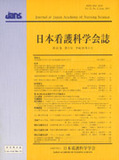Japanese
English
- 販売していません
- Abstract 文献概要
- 参考文献 Reference
- サイト内被引用 Cited by
要旨
目的:乳がん再発・転移患者のコーピング強化のケア視点を明確にするために,コーピング方略と心理的適応の影響要因を明らかにすることである.
方法:乳がん再発・転移患者64名を対象とした.日本語版Mental Adjustment to Cancer ScaleとTri-axial Coping Scale-24を使用し,心理的適応,コーピング方略,個人要因,6支援要因の認知の関係を単変量解析,相関,重回帰分析,共分散構造分析でみた.
結果および結論:「Fighting Spirit」の高い群が「肯定的解釈」の方略を,「Helplessness/Hopelessness」の高い群が「放棄・諦め」の方略を有意に多く使用していた.末梢神経障害やサポート機能をもたない家族関係は心理的適応を妨げていた.支援要因の「情報に対する満足」と「初期治療に対する納得」は「看護師,医者への信頼」と互いに関係し合いながら「肯定的解釈」を強化して心理的適応に影響を与えていた.これらの要因を診断時より長期プロセスを見据えてシステム化していくことが,乳がん再発・転移患者のよりよい療養生活を支えるための支援の糸口となることが示唆された.
Abstract
Purpose:The purpose of this study was to clarify the coping strategies and factors affecting psychological adaptation among breast cancer patients with recurrence/metastasis in order to support their coping with cancer.
Methods:64 women with breast cancer who were informed of a recurrence or metastasis completed a questionnaire comprised of the Japanese edition of the Mental Adjustment to Cancer(MAC) Scale, the 24-item version of the Tri-axial Coping Scale(TAC-24), and information pertaining to demographic variables. The patients' recognition of six supportive factors were obtained using a specially designed questionnaire. Data were subjected to univariate analysis, correlation analysis, multiple regression analysis, and covariance structure analysis in order to assess the above-mentioned factors.
Results and Conclusions:Significantly more patients with higher “Fighting Spirit” were found to use the “Affirmative interpretation” strategy, while significantly more patients with higher scores in “Helplessness/Hopelessness” used the “Abandonment/Resignation” strategy. “Peripheral neuropathy” and a “family relationship without an effective support function” were found to have negative effects on the patients' psychological adjustment. “Satisfaction with information” and “Consent for primary care” were support factors that strengthened “Affirmative interpretation.” Furthermore, these factors were both associated with “Trusting the nurse” and “Trusting the doctor” and had positive effects on the patients' psychological adjustment. Cancer patients have high stress levels and require systematized psychosocial intervention as a component of their long-term care following their initial diagnosis.
Copyright © 2011, Japan Academy of Nursing Science. All rights reserved.


